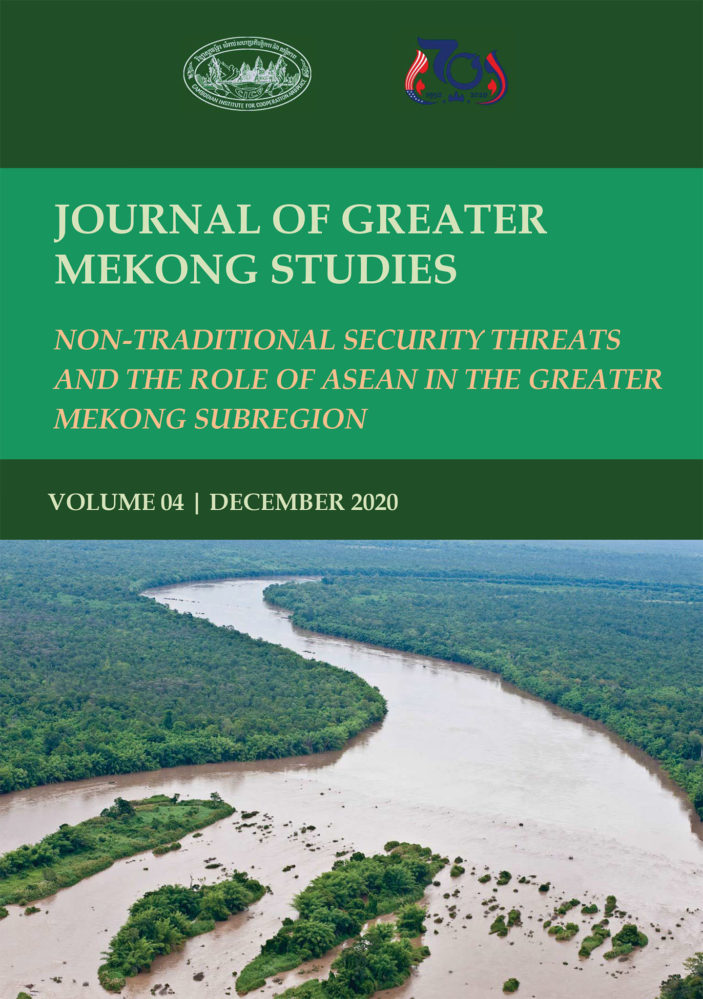
Journal of Greater Mekong Studies
Non-Traditional Security Threats and the role of ASEAN in the Greater Mekong Subregion
VOLUME 04 | DECEMBER 2020
Editor's Note
As the states comprising the Greater Mekong Subregion (GMS) look ahead to 2021, we confront a landscape significantly changed from that of just one year ago. Among the most significant developments has been the launching of the new Mekong-US Partnership, the successor institution to Washington’s Lower Mekong Initiative. On behalf of CICP, I am very pleased that our lead article in this edition comes from U.S. Assistant Secretary of State for the Bureau of East Asian Affairs David R. Stilwell, who discusses the role that the Partnership will play in the subregion and the wide range of challenges that both the subregion and ASEAN as a whole now confront. In addition, Assistant Secretary Stilwell’s article sets out the comprehensive nature of the new Partnership; it is precisely that theme of a comprehensive understanding of the region that frames this edition of the journal.
While much ink has been spilt over the last few years discussing security issues in the subregion, non-traditional security threats have received comparatively less attention, yet these are essential to truly develop a comprehensive grasp of the subregion today. Cambodia’s own experience in 2020 of drought, rising inequality, and food security questions underscores the timeliness of these topics and the important weight they should be given in the development of future agendas for subregional cooperation, human security, and sustainable development.
Among the contributors to this edition, Solinn Lim, Cambodia country director for Oxfam, takes a deep dive into the question of inequality and the measures needed to ensure subregional growth models are sustainable and equitable. Noel Morada examines the question of vulnerable populations, heightened risks of atrocities, and the role that ASEAN can play to mitigate these threats. Yang Jiayi and Li Fujian explore the dynamics of health security and the collaboration and cooperation required improve outcomes in this area for the GMS state. In a year in which Cambodia has experienced both extreme drought and extreme flooding, Mak Sithirith probes the question of the future of water security. To Minh Thu takes up the question of food security and the extreme and diverse pressures that access to nutrition has confronted over the last year. David Hutt takes a critical look at the question of subregional electricity production in the context of China-Laos relations. While David Mathieson investigates questions of human trafficking, narcotics, and migration in Myanmar. Finally, I am happy to introduce a new section of JGMS – the first in a new series of book reviews. In this edition, Bradley J. Murg reviews Sebastian Strangio’s In the Dragon’s Shadow: Southeast Asia in the Chinese Century.
On behalf of HRH Samdech Norodom Sirivudh, the Chairman of CICP, I would like to thank all of our authors for their excellent contributions to furthering understanding of the subregion.
Ambassador Pou Sothirak
Executive Director, Cambodian Institute for Cooperation and Peace
As the states comprising the Greater Mekong Subregion (GMS) look ahead to 2021, we confront a landscape significantly changed from that of just one year ago. Among the most significant developments has been the launching of the new Mekong-US Partnership, the successor institution to Washington’s Lower Mekong Initiative. On behalf of CICP, I am very pleased that our lead article in this edition comes from U.S. Assistant Secretary of State for the Bureau of East Asian Affairs David R. Stilwell, who discusses the role that the Partnership will play in the subregion and the wide range of challenges that both the subregion and ASEAN as a whole now confront. In addition, Assistant Secretary Stilwell’s article sets out the comprehensive nature of the new Partnership; it is precisely that theme of a comprehensive understanding of the region that frames this edition of the journal.
While much ink has been spilt over the last few years discussing security issues in the subregion, non-traditional security threats have received comparatively less attention, yet these are essential to truly develop a comprehensive grasp of the subregion today. Cambodia’s own experience in 2020 of drought, rising inequality, and food security questions underscores the timeliness of these topics and the important weight they should be given in the development of future agendas for subregional cooperation, human security, and sustainable development.
Among the contributors to this edition, Solinn Lim, Cambodia country director for Oxfam, takes a deep dive into the question of inequality and the measures needed to ensure subregional growth models are sustainable and equitable. Noel Morada examines the question of vulnerable populations, heightened risks of atrocities, and the role that ASEAN can play to mitigate these threats. Yang Jiayi and Li Fujian explore the dynamics of health security and the collaboration and cooperation required improve outcomes in this area for the GMS state. In a year in which Cambodia has experienced both extreme drought and extreme flooding, Mak Sithirith probes the question of the future of water security. To Minh Thu takes up the question of food security and the extreme and diverse pressures that access to nutrition has confronted over the last year. David Hutt takes a critical look at the question of subregional electricity production in the context of China-Laos relations. While David Mathieson investigates questions of human trafficking, narcotics, and migration in Myanmar. Finally, I am happy to introduce a new section of JGMS – the first in a new series of book reviews. In this edition, Bradley J. Murg reviews Sebastian Strangio’s In the Dragon’s Shadow: Southeast Asia in the Chinese Century.
On behalf of HRH Samdech Norodom Sirivudh, the Chairman of CICP, I would like to thank all of our authors for their excellent contributions to furthering understanding of the subregion.
Ambassador Pou Sothirak
Executive Director, Cambodian Institute for Cooperation and Peace
